
- Subject:
- Psychology
- Social Science
- Material Type:
- Syllabus
- Provider:
- CUNY Academic Works
- Provider Set:
- City College
- Author:
- Taskakan, Emel
- Date Added:
- 01/30/2020

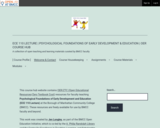
This course hub website contains OER/ZTC (Open Educational Resources/Zero Textbook Cost) resources for faculty teaching Psychological Foundations of Early Development and Education (ECE 110 Lecture) at the Borough of Manhattan Community College (BMCC). These resources are freely available for use by BMCC faculty and beyond.

This syllabus was created for undergraduate students majoring in Secondary Education. The class topics and accompanying readings were organized to create a comprehensive overview of adolescent development as it relates to educators teaching adolescent students. The readings were picked specifically to encourage critical thinking and analysis of the class topics.

This books lays the foundation for prospective teachers to learn about various teaching methodologies and covers material typically found in many teacher training programs. Chapters in the text can be assigned either from beginning to end, as with a conventional printed book, or they can be selected in some other sequence to meet the needs of particular students or classes. In general the first half of the book focuses on broader questions and principles taken from psychology per se, and the second half focuses on somewhat more practical issues of teaching. But the division between “theory” and “practice” is only approximate; all parts of the book draw on research, theory, and practical wisdom wherever appropriate. Chapter 2 is about learning theory, and Chapter 3 is about development; but as we point out, these topics overlap with each other as well as with the concerns of daily teaching. Chapter 4 is about several forms of student diversity (what might be called individual differences in another context), and Chapter 5 is about one form of diversity that has become prominent in schools recently—students with disabilities. Chapter 6 is about motivation, a topic that is heavily studied by psychological researchers, but that also poses perennial challenges to classroom teachers.

This is a syllabus designed to work as a "frame" that you can use and populate together with students. The goal is to provide a perspective from environmental psychology.

Apply critical thinking to the research scenarios and act ethically based on APA Principles in the conduct of research with humans.

Students read about drugs which enhance student academic performance.They will connect the found information to prior course material, addressing neuroanatomy and neurophysiology as well as connect to the attention course chapter. Students will also delve into the ethical components of the use of brain enchasing drugs and compare them to sports performance-enhancing drugs.

Current research on the evolution and development of cognition and affect, including intuitive physics, biology, and psychology, language, emotions sexuality, social relations.

HW assignment exploring the sensation seeking traits in humans.

Experimental Methods of Adjustable Tetrode Array Neurophysiology

Syllabus for Experimental Psychology Course

This syllabus outlines the Fall 2023 Freshman Inquiry Writing Seminar (FIQWS) course Psychopathology in Literature. In the topic section, students learn about the history, research, ethics, and practice of psychopathology. This topic course is accompanied by a composition course in which students will apply their understanding of psychopathology to creative and research writing assignments.
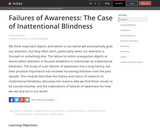
We think important objects and events in our world will automatically grab our attention, but they often don’t, particularly when our attention is focused on something else. The failure to notice unexpected objects or events when attention is focused elsewhere is now known as inattentional blindness. The study of such failures of awareness has a long history, but their practical importance has received increasing attention over the past decade. This module describes the history and status of research on inattentional blindness, discusses the reasons why we find these results to be counterintuitive, and the implications of failures of awareness for how we see and act in our world.
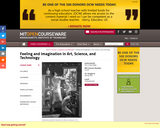
Seminar on the creativity in art, science, and technology. Discussion of how these pursuits are jointly dependent on affective as well as cognitive elements in human nature. Feeling and imagination studied in relation to principles of idealization, consummation, and the aesthetic values that give meaning to science and technology as well as literature and the other arts. Readings in philosophy, psychology, and literature.
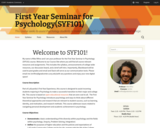
Part of LaGuardia’s First Year Experience, this course is designed to assist incoming students majoring in Psychology to make a successful transition to their major and college life. This course is based on open educational resources that are zero-cost to all. The First Year Seminar for Psychology introduces psychology and ways to think about different theoretical approaches and research that are relevant to student success, such as learning, identity, and motivation, and research methods. This course addresses issues related to navigating personal development and academic achievement in psychology.

The "Flipping the Script: Challenging Our Perceptions about Race” Lesson Plan provides a step by step plan on how to conduct this workshop. Also, the Lesson Plan provides a link to an After Event Toolbox that was designed to allow participants to continue the conversation after the workshop is completed.

Major narrative texts from diverse Western cultures, beginning with Homer and concluding with at least one film. Emphasis on literary and cultural issues: on the artistic significance of the chosen texts and on their identity as anthropological artifacts whose conventions and assumptions are rooted in particular times, places, and technologies. Syllabus varies, but always includes a sampling of popular culture (folk tales, ballads) as well as some landmark narratives such as the Iliad or the Odyssey, Don Quixote, Anna Karenina, Ulysses, and a classic film. This class will investigate the ways in which the formal aspects of Western storytelling in various media have shaped both fantasies and perceptions, making certain understandings of experience possible through the selection, arrangement, and processing of narrative material. Surveying the field chronologically across the major narrative genres and sub-genres from Homeric epic through the novel and across media to include live performance, film, and video games, we will be examining the ways in which new ideologies and psychological insights become available through the development of various narrative techniques and new technologies. Emphasis will be placed on the generic conventions of story-telling as well as on literary and cultural issues, the role of media and modes of transmission, the artistic significance of the chosen texts and their identity as anthropological artifacts whose conventions and assumptions are rooted in particular times, places, and technologies. Authors will include: Homer, Sophocles, Herodotus, Christian evangelists, Marie de France, Cervantes, La Clos, Poe, Lang, Cocteau, Disney-Pixar, and Maxis-Electronic Arts, with theoretical readings in Propp, Bakhtin, Girard, Freud, and Marx.
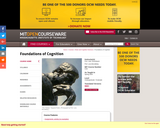
Advances in cognitive science have resolved, clarified, and sometimes complicated some of the great questions of Western philosophy: what is the structure of the world and how do we come to know it; does everyone represent the world the same way; what is the best way for us to act in the world. Specific topics include color, objects, number, categories, similarity, inductive inference, space, time, causality, reasoning, decision-making, morality and consciousness. Readings and discussion include a brief philosophical history of each topic and focus on advances in cognitive and developmental psychology, computation, neuroscience, and related fields. At least one subject in cognitive science, psychology, philosophy, linguistics, or artificial intelligence is required. An additional project is required for graduate credit.

" This team-taught multidisciplinary course provides information relevant to the conduct and interpretation of human brain mapping studies. It begins with in-depth coverage of the physics of image formation, mechanisms of image contrast, and the physiological basis for image signals. Parenchymal and cerebrovascular neuroanatomy and application of sophisticated structural analysis algorithms for segmentation and registration of functional data are discussed. Additional topics include: fMRI experimental design including block design, event related and exploratory data analysis methods, and building and applying statistical models for fMRI data; and human subject issues including informed consent, institutional review board requirements and safety in the high field environment. Additional Faculty Div Bolar Dr. Bradford Dickerson Dr. John Gabrieli Dr. Doug Greve Dr. Karl Helmer Dr. Dara Manoach Dr. Jason Mitchell Dr. Christopher Moore Dr. Vitaly Napadow Dr. Jon Polimeni Dr. Sonia Pujol Dr. Bruce Rosen Dr. Mert Sabuncu Dr. David Salat Dr. Robert Savoy Dr. David Somers Dr. A. Gregory Sorensen Dr. Christina Triantafyllou Dr. Wim Vanduffel Dr. Mark Vangel Dr. Lawrence Wald Dr. Susan Whitfield-Gabrieli Dr. Anastasia Yendiki "
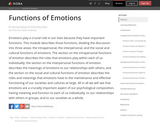
Emotions play a crucial role in our lives because they have important functions. This module describes those functions, dividing the discussion into three areas: the intrapersonal, the interpersonal, and the social and cultural functions of emotions. The section on the intrapersonal functions of emotion describes the roles that emotions play within each of us individually; the section on the interpersonal functions of emotion describes the meanings of emotions to our relationships with others; and the section on the social and cultural functions of emotion describes the roles and meanings that emotions have to the maintenance and effective functioning of our societies and cultures at large. All in all we will see that emotions are a crucially important aspect of our psychological composition, having meaning and function to each of us individually, to our relationships with others in groups, and to our societies as a whole.